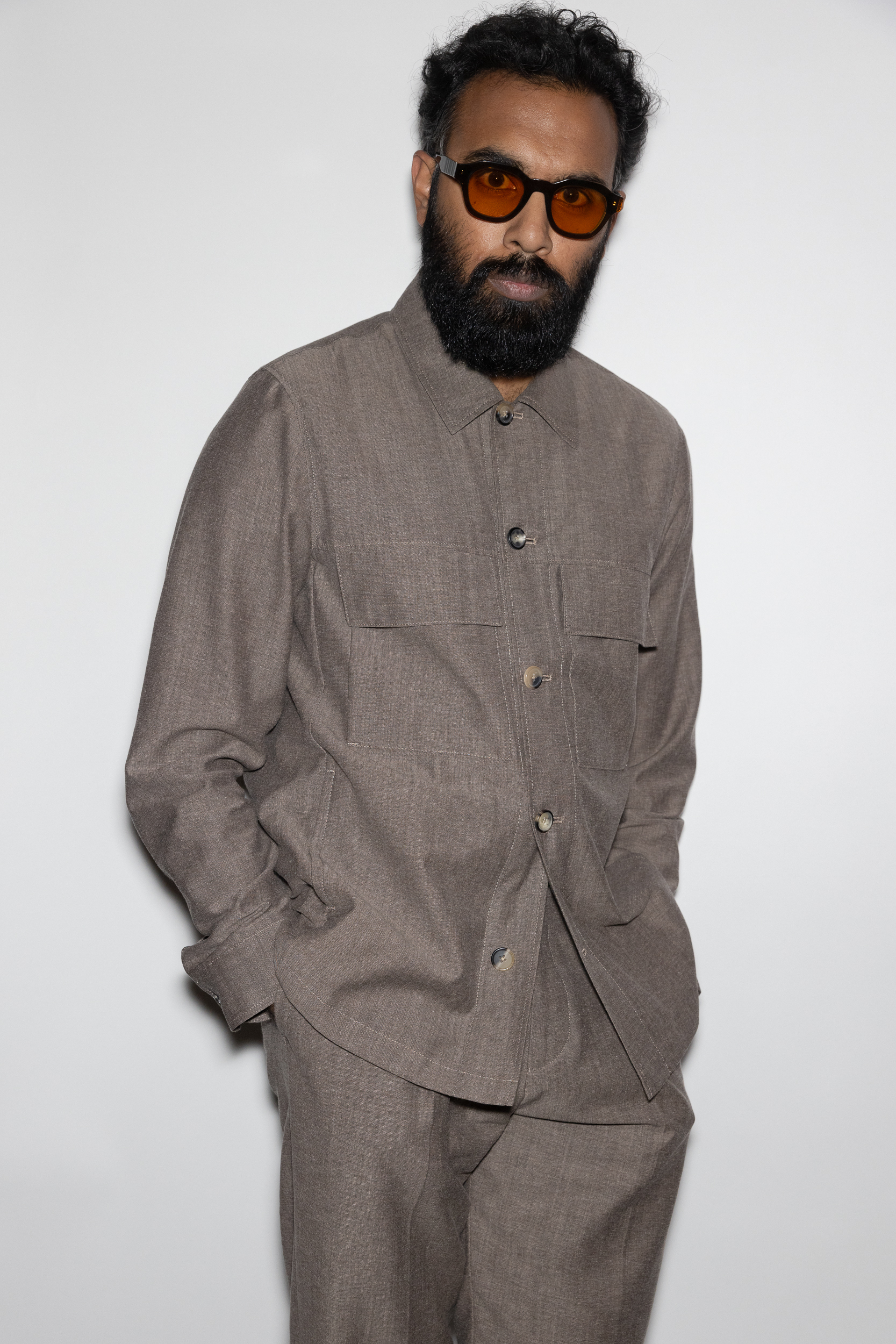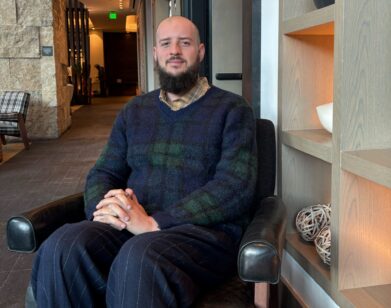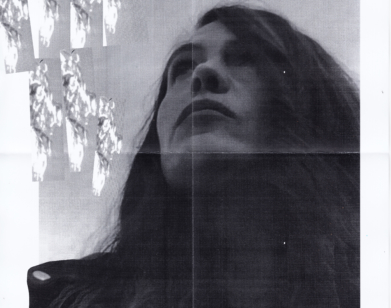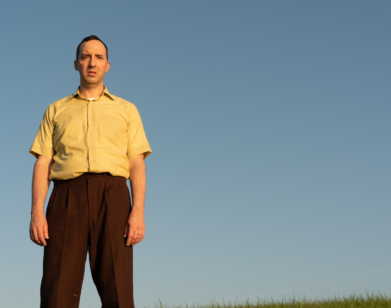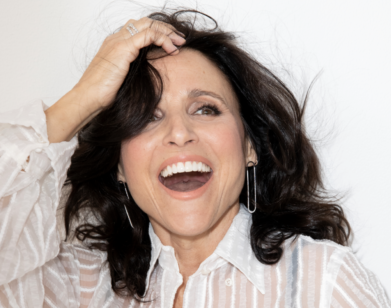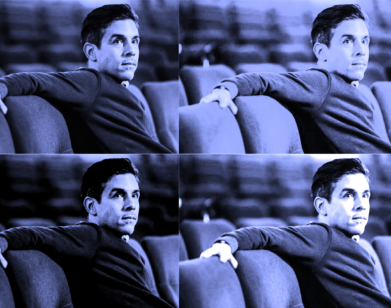IN CONVERSATION
Himesh Patel and Dan Levy on Big-Budget Movies and On-Set Catering
Himesh Patel’s new HBO series The Franchise, Jon Brown and Armando Iannucci’s sharp satire of big-budget superhero movies, takes a long, hard look at an industry that’s never quite been known for its bedside manner. Patel, who plays the anxious but ultimately optimistic director, Daniel, has been in front of the camera for more than half of his life, so he’s no stranger to the absurdities of an industry where commerce can often supplant creativity. Neither is Schitt’s Creek star and Emmy winner Dan Levy, Patel’s co-star in the 2023 Netflix film Good Grief. “I feel confused about the state of our industry and its priorities and what it really wants at the end of the day, because money has certainly played a big part in everything and will only continue to,” Levy confided when the two on a call earlier this month. “But I think what’s fascinating about your show is your optimism.” To mark the release of the The Franchise, the pair got together to talk about staying grounded in Hollywood, growing up a sex-symbol, and the importance of good catering.
———
DAN LEVY: What’s that snazzy shirt?
HIMESH PATEL: It’s a Patagonia fleece that I bought in Toronto, actually.
LEVY: Really?
PATEL: Because they don’t have Patagonia stores in London.
LEVY: Why?
PATEL: I don’t know. They’ve got one in Manchester, but not in London. I was like, “Oh my god, a whole store full of Patagonia,” and I had to buy something.
LEVY: Patagonia, what an ethical delight.
PATEL: Completely.
LEVY: Well, I guess I’ll just start asking you questions. I didn’t know you had a Teen Choice nomination.
PATEL: Yeah, I did.
LEVY: Did you go to the Teen Choice Awards?
PATEL: No, I couldn’t for some reason. I’m not sure why or when it was, but I couldn’t.
LEVY: For some reason, the visual of you at the Teen Choice Awards is one of the most entertaining things my brain can come up with.
PATEL: I know. It’s a shame it didn’t happen, but I think probably for the best?
LEVY: I think you might have one of the most varied resumes of award nominations out of any actor in Hollywood, or in England for that matter, which includes a Teen Choice nomination, an Inside Soap Awards win.
PATEL: Yeah, what did we win… Best Wedding?
LEVY: It might’ve been Best Wedding. And on top of that, you just sprinkled in SAG and Emmy nominations. It’s stunning. I had to do research for this because I didn’t want to show up underprepared. I’m going to just start by asking you my own personal questions that I’ve always wanted to know, and now we’re in a forced environment where you have to answer them.
PATEL: You’ve got my hands tied.
LEVY: And then we’ll get into the show. Obviously, you’re incredible on it. I’ll start by saying that there are a lot of similarities between you and the character you play. Do you agree?
PATEL: I’d say so, except my marriage isn’t falling apart and I do see enough of my children.
LEVY: I guess I found overlap in the irritability.
PATEL: Oh, yeah.
LEVY: There are moments in that show where I’m like, “Well, that’s just Himesh.” Would you call yourself a tough nut to crack?
PATEL: Probably. It takes me a while to get into the groove with new people, because my natural thing is to just sit back and be quiet and not make myself known. It takes a while for me to really feel like I can be vulnerable in front of people, which is funny as an actor, because if you tell me you’ve written a play and we’re doing it tomorrow and you have to do XYZ , I’m like, “Great, I can do that.” But I’m not doing it as myself.
LEVY: Well, I feel very proud of my friendship with you because I feel like you don’t necessarily let everyone into your life.
PATEL: That’s true. Although I feel like over the last 10 or so years I’ve really gained a lot of wonderful friends. I just had drinks for my birthday in London and felt very loved. I was like, “I know a lot of wonderful people, actually.” And it’s a nice time of my life where I feel like I genuinely like all these people.
LEVY: That’s such a rare and wonderful thing for someone to say, that they genuinely like everyone in their lives. Being at your house for dinner the other night, I noticed you do have such a lovely group of friends. It’s a wonderfully–I don’t want to use the word curated, because that would imply some kind of strategy behind it…
PATEL: Everyone gets interviewed.
LEVY: Yeah, there’s a full vetting process. But it was interesting because I feel like everyone around that dinner table had a very distinct point of view. Everyone took up a very different bit of space, and it was lovely to engage in that conversation because it was such a varied assortment of people, yet the common thread seemed to be curiosity, intelligence, and humor.
PATEL: I think curiosity is definitely a thing for me. But it was lovely, and even though everyone was in the same field, it felt like everyone was coming at everything from a different angle.
LEVY: Correct.
PATEL: I was talking to someone about this the other day. The thing about London, and also New York, is that they’re such melting pots. Everyone’s not aiming for the same thing, so you’re just naturally going to be drawn together with people who are different from you.
LEVY: Yes. There is a prominent feeling when you’re in L.A. that actors or people in entertainment are defined by their job, and it becomes their personality. When you go to London, it’s refreshing to be around a table full of actors and maybe not even talk about a job. And I think that’s often because as an actor in England, the goal isn’t necessarily fame, it’s employment.
PATEL: Yeah, and I think that’s got something to do with the fact that in the U.K., it’s very much a theater tradition that most things are born out of. But yeah, the aim is not to be famous. The aim is to do good work.
LEVY: Not to completely get on a tangent here, but you did say that your first job was when you were 16. Do you consider yourself a child actor?
PATEL: To some degree, yeah. For half my life now, I’ve been in the public eye. I do have to reckon with the fact that it has had a fundamental impact on my being because—
LEVY: You don’t strike me as a child actor, though. There’s a precociousness to child actors that you don’t have, in a good way.
PATEL: Maybe that got drilled out of me. There was probably something slightly precocious about me when I was 16. But then I think I didn’t really ever fall in with a crowd—
LEVY: No rehab stint?
PATEL: No, that’s not happened yet. But I always felt like I didn’t fit with that main thread, as it were. In both youth theaters I went to, there was a main group of kids who would often play the leads in the play, and I was always just felt like me and my friends were the weird ones off to the side a little bit.
LEVY: Can I give a compliment, maybe? How would you feel about me calling you a low-key sex symbol?
PATEL: Listen, if that’s how you feel, that’s great.
LEVY: I don’t think it’s just how I feel. I think if we went on Reddit, you would find that there are a lot of people out there who consider you to be one.
PATEL: That’s great. I mean, the thing with that is, it’s like it’s not really up to you, is it?
LEVY: I would argue there’s some actors in Hollywood who definitely feel like it’s up to them.
PATEL: Of course. But, again, it’s like, what are you aiming for? What do you want? For me, and it’s perhaps to a fault, I just want to do my work and let that do the talking.
LEVY: You’re saying you didn’t get into EastEnders dreaming of being a sex symbol?
PATEL: No, and let me tell you, I certainly was not a sex symbol on that show.
LEVY: I think for a specific demographic of people. Those glasses were hot.
PATEL: Yes. Sure.
LEVY: I want to talk about the show, because I feel like there’s two things happening: There’s a statement being made about Hollywood, and it’s also just a very silly show that people are talking about. So first and foremost, what made you say yes?
PATEL: It was the people attached, obviously, and what I read on the page. There was a feeling of, “Is this too inside baseball? I know it’s going to be good, but how broad could the appeal be? “But then, when you look at the people involved, Armando [Ianucci] obviously is… I don’t really have the words for Armando. I think he’s one of the most important voices to come out of the UK comedy scene. And I’d worked with him and also with Jon Brown, who’s our showrunner, so I was like, “Okay, I know those guys. I know they know what they’re doing.” And since then, Jon’s worked on Succession, which is pretty good…
LEVY: I hear it’s great.
PATEL: [Laughs]. Yeah. So I was like, “Okay, Jon especially is going to be carrying us through this whole thing. Armando will be there guiding, as will Sam Mendes,” who directed the pilot. And when a name like Sam Mendes is attached, you’re like, “Well, to have someone like that–”
LEVY: Right. “I think I’d actually be run out of Hollywood if I said no.”
PATEL: Yeah. I think to have someone like that set you off and go, “First episode and I’ll be watching,” makes you go, “I think this will probably have a pretty good chance of being good.”
LEVY: The first episode opens with a long single tracking shot, which as an actor watching it, I got intense amounts of anxiety becaus in my head it’s like, “One wrong word, one wrong step, and you have to start it all again.”
PATEL: There was plenty of that.
LEVY: Were you nervous going into it?
PATEL: Yeah. If I’m not mistaken, we basically spent two or three days rehearsing it and then just dove straight in. I remember reading it the first time and going, “If Sam Mendes is directing this, he’ll want to do this in one shot, I think.” And that’s what he wanted to do.
LEVY: Do you get intimidated by that, or are you excited?
PATEL: I am, but it’s also the kind of thing that I will run towards, because I also have my cinema nerd head where I’m like, I’ve always loved shots like that. I also run a million miles an hour towards it because you’ll learn something along the way. You have to switch on some muscles that you otherwise don’t always have to with screen work.
LEVY: In my case, I’m scared of learning that I’m bad at my job.
PATEL: I feel like I go into every job with that fear though.
LEVY: Oh, god. Yeah. I think one of the great little reveals about your character in that first episode, and then ultimately what becomes a part of his journey, is optimism, because you see him just carrying the weight of the world on his shoulders. Would you say you’re an optimist yourself?
PATEL: I’m not as much of an optimist inherently, but when it comes to my work and the industry that we’re in, I have to be. Otherwise, that will really drag me down and make me incredibly cynical, because I’m not just in it to take home a paycheck. I’m in it because I want to do good work. I want to keep pushing myself as an actor and find new opportunities. I’m also trying to enjoy the moment for sure, because you just don’t know what’s around the corner. It’s such an absurd industry.
LEVY: I know.
PATEL: That’s what we highlight in the show, the absurdity of what we do. You’ve got to love it, otherwise you’d just curl up into a ball and not move.
LEVY: It’s like a circus. I feel confused about the state of our industry and its priorities and what it really wants at the end of the day, because money has certainly played a big part in everything and will only continue to. But I think what’s fascinating about your show is your optimism, and then spending months shooting a television show that essentially reveals how we’ve gotten to a point where creativity really can tend to sit on the back burner to make way for commerce and product placement.
PATEL: One of our cast members reposted something from this Instagram account called Movie Set Humor. It’s this screen grab of the show and they were like, “There’s a show about our lives. Anyone seen it yet?” And I dived into the comments and someone had said, “Can’t wait for the episode where they talk about someone driving home at night crashing and dying, and then just make light of it and move on.”
LEVY: I can personally verify most of the things on that show.
PATEL: Yeah. I’ve definitely been in situations where someone is really overworked and everyone just has to carry on making a TV show. And it does make you go, “What are we doing?” But then, again, I think you could be cynical about it and go, “Well, what we do is pointless,” but it’s not.
LEVY: No.
PATEL: It’s very important. But I just think there’s a sacrifice level to it that sometimes we need to check.
LEVY: Yeah. And I think it’s exploring one genre of moviemaking, which is blockbuster movies, where inherently the stakes are much higher. Money is coming from a variety of different places. You have to have a Chevrolet drive through your shot at least three times to get the money. But you’ve dabbled in big-budget and independent films and I guess my question is, are there any similarities or are they two completely different worlds?
PATEL: No, there are similarities. I think it just depends on how you want to set up your production. Even working on Tenet, there’s something about the way Chris Nolan sets the whole thing up that just the money’s all in front of the camera. I know he started out making movies on a little camera on the weekends, and I wonder whether the dynamic hasn’t particularly shifted behind the camera since. I think it’s about how you want to go about doing it in a sense that, if it’s a low-budget indie, you’ve got less choice. You’ve got to set your film up a certain way. We can’t have huge trailers. We can’t have X, Y, and Z. And I think for a big movie, you just lean into all that stuff because you can. And look, there are certain things that are good to have. If you’ve got the money, please feed your crew properly.
LEVY: You don’t have to tell me. People need good food to feel good about themselves, to feel nourished, to feel respected. Having made a film myself that, fortunately, you said yes to, I knew going into it that we needed good food on set, because with Schitt’s Creek, the minute we upgraded the catering, everything changed.
PATEL: That’s when the Emmys rolled in.
LEVY: [Laughs] Good food equals awards, ultimately.

